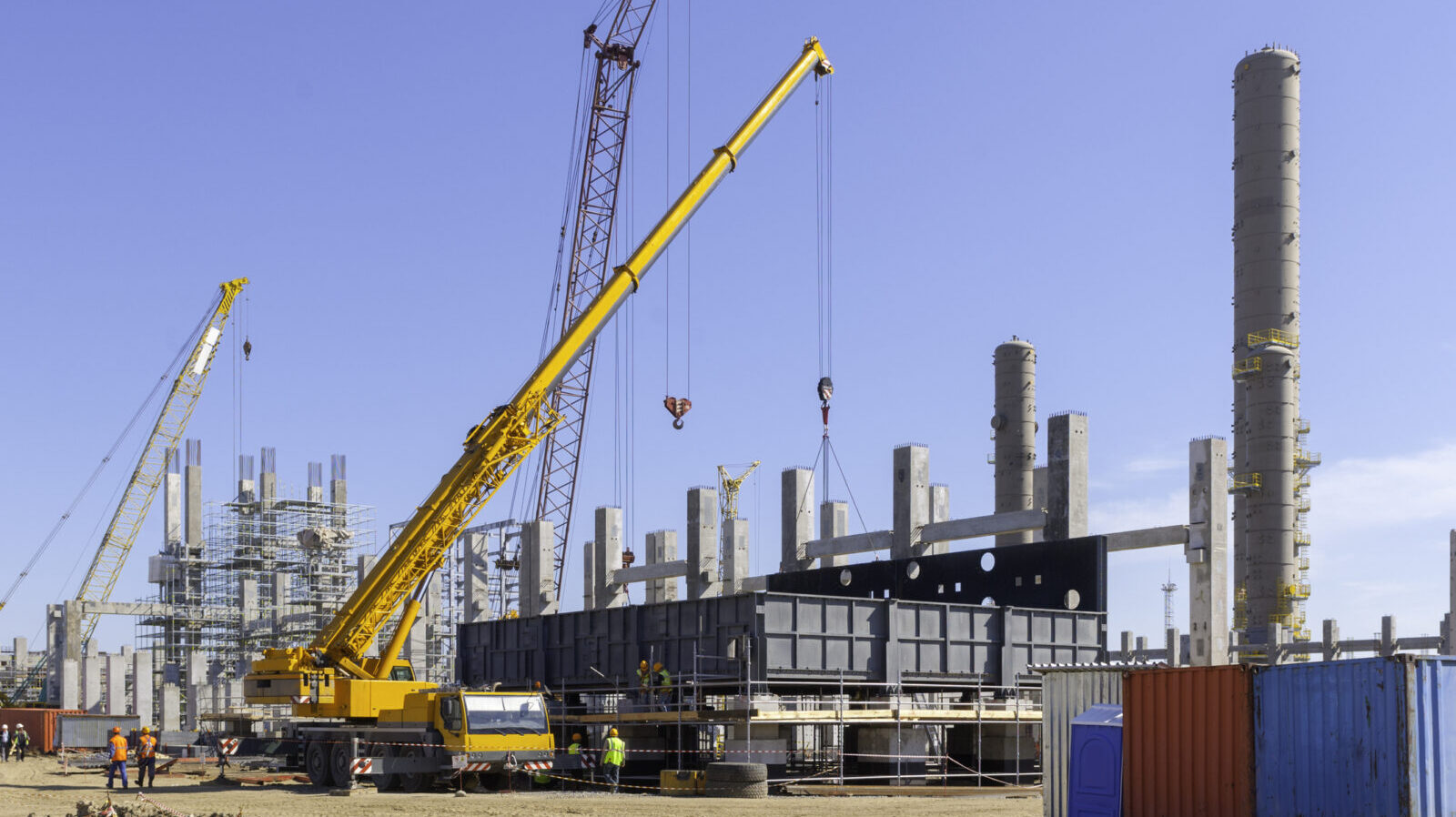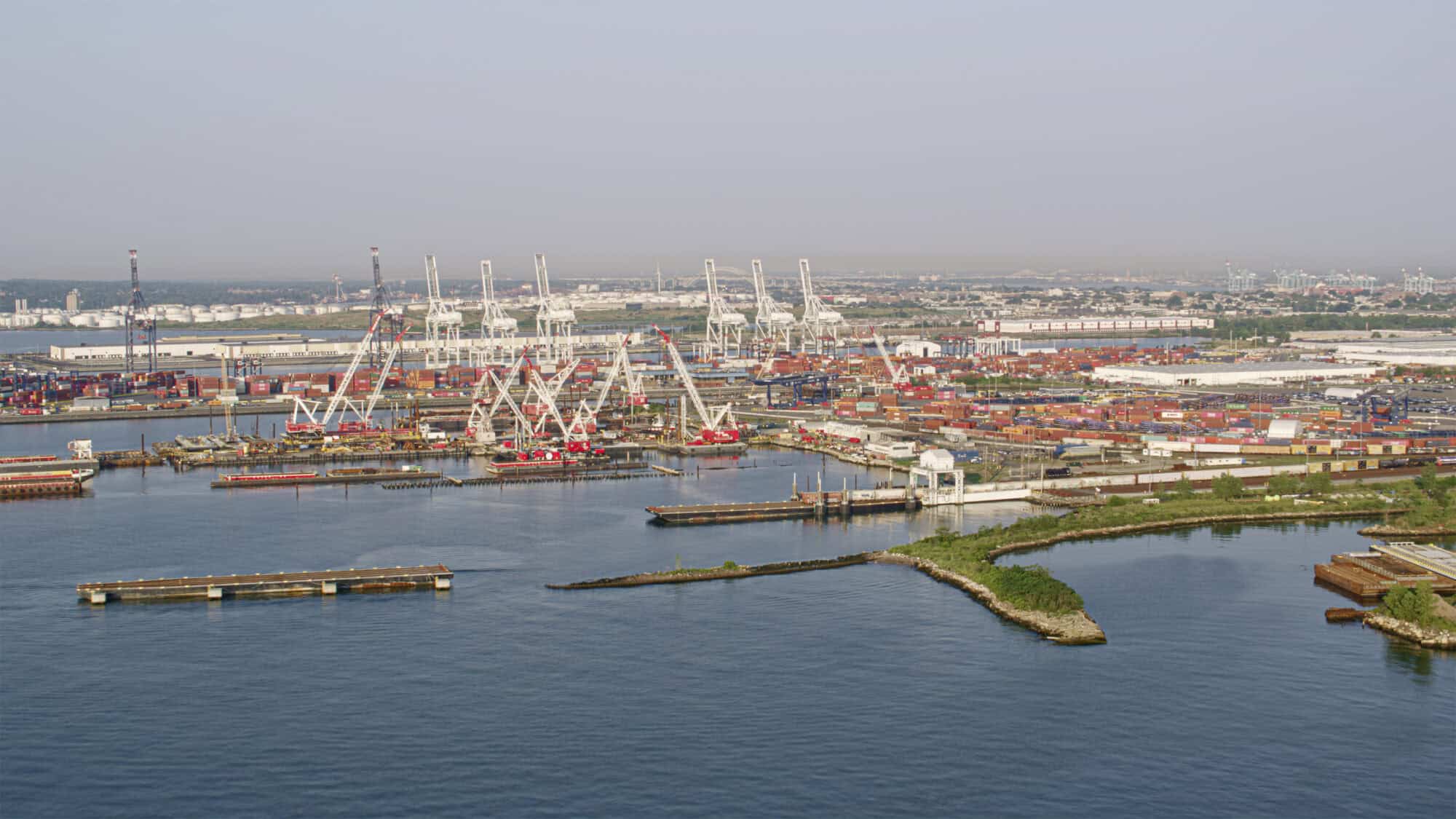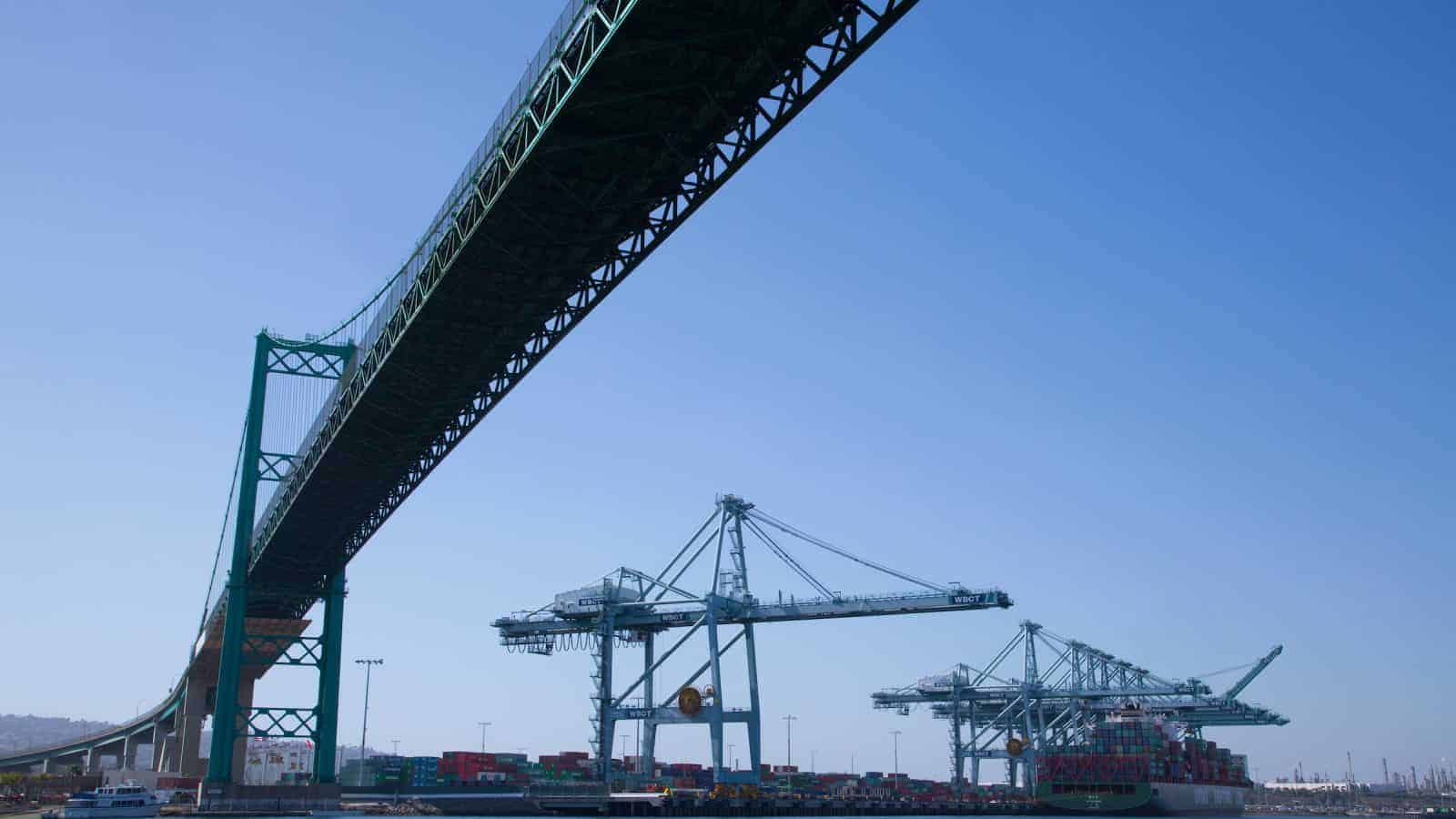It’s Infrastructure Week!

During United for Infrastructure’s Infrastructure Week, the NAM—an active member of the steering committee—participated in several events in Washington, D.C., highlighting the urgent need for permitting reform to accelerate U.S. building projects.
A reception: The NAM hosted a reception to kick off Infrastructure Week 2025 at its headquarters in partnership with United for Infrastructure, with special guest Sen. Shelley Moore Capito (R-WV), chair of the Senate Committee on Environment and Public Works.
- Nucor, Fluor Corporation and CRH sponsored the event.
A panel: NAM Vice President of Domestic Policy Chris Phalen spoke at the United for Infrastructure signature event, underlining the need for commonsense trade and permitting policies.
- “I think we can work with governments to address supply chain challenges,” he said when asked about tariffs. “We have a really important window of opportunity over the next 50 odd days to get some deals that provide zero tariffs on industrial trade. That is what manufacturers support.”
- “Manufacturers rely on transportation networks … to get our goods to and from ports to customers,” Phalen said regarding infrastructure, “but we also are making everything that goes into making transportation work, from aluminum to steel, from asphalt to aggregates, copper, circuitry and the large industrial machinery that builds [and] maintains roads, bridges, factories [and] power plants. So, it’s kind of a virtuous cycle where we’re investing in infrastructure.”
“Comprehensive manufacturing strategy”: Phalen also gave a brief overview of the NAM’s “comprehensive manufacturing strategy.”
- Revising the regulatory framework is a key priority, he said. “We’ve submitted dozens of letters to 10 separate federal agencies as part of President Trump’s deregulatory agenda. Manufacturers every year are spending $350 billion just to comply with federal regulations. And so we’ve been really pleased to see the start of this regulatory rebalancing from the administration.”
- Phalen cited moves including “reopening LNG export facility applications, rebalancing Clean Air Act rules … and streamlining and improving the process to improve new chemicals … at the EPA.”
- “Probably most important is permitting reform,” he added. “Manufacturers operate and employ and invest in the communities where we’re producing, so we don’t want to see any short-circuiting of public input. … [T]here does have to be recognition, though, that the way that things were set up in the late ’60s and early ’70s is hindering infrastructure of all kinds right now.”
A roundtable: The NAM also participated in a roundtable on continuing federal support for water infrastructure investments. NAM Director of Transportation, Infrastructure and Labor Policy Max Hyman shared perspectives on how these investments benefit manufacturers by driving demand for their products and providing an essential service for operations.
The last word: As NAM President and CEO Jay Timmons said during the reception, “Infrastructure is the foundation of manufacturing in the U.S.”
How Manufacturers Can Save Millions Through Incentives Programs

“$80 billion is given away every year in state and local incentives,” according to Atlas Insight Managing Partner Brian Corde. “Plus, the Biden administration has added $455 billion just in federal grants.”
In this investment landscape, manufacturers need all the help they can get finding, applying for and complying with these incentive programs. Atlas Insight, the NAM’s partner for its Incentives Locator, walks companies through this entire complicated process.
Last week, we talked to Corde and Kathy Mussio, Atlas’s other managing partner, about how companies select their new sites. This week, we’ve asked them what manufacturers need to know about incentives.
How do incentives work? Incentives come in two forms, Corde and Mussio explained. First is the type you automatically qualify for if you meet the requirements, known as statutory or as-of-right incentives.
- The second is the type that Atlas lends its expertise to—discretionary incentives. These programs offer funds and other pools of money that require business cases, negotiation, applications, and later, proof that a company has met its stated obligations (also known as compliance).
- These programs can take many forms. As Mussio put it, “Some states have programs that offer cash to help close the financial gap between two competing locations or increase a project’s ROI—helping to make a location more competitive in the financial analysis.”
- There are many, many incentives out there, the Atlas partners told us, and the most important steps are understanding which ones a company may be eligible for and helping clients quantify the potential savings.
What if you’re staying put? These incentives aren’t just for new facilities, Corde and Mussio emphasized. “A majority of incentives are given to companies staying in place,” Corde added.
- Companies can take a lot of actions to qualify for incentives—expand their workforces, buy new equipment, train workers in new technologies or add square footage for new production lines.
- “It’s our job to help NAM members identify their projects that could use incentives. Then we benchmark the incentives, then negotiate on the companies’ behalf, then lock the incentives down with the state or city,” Corde said.
What’s benchmarking? Atlas compares incentive offers from states and localities with the incentives awards that similar companies have received in the past, another way to help ensure that their clients get the best possible deals. There’s always room for negotiation, the partners say.
- Atlas keeps two databases: the first, a listing of all the incentives that exist on the federal, state and local levels, along with all the necessary forms, key contacts and any other requirements. The second database is a list of what other companies have received for similar types of projects.
- This allows Atlas to identify the typical dollar range that an incentive should provide—so a company knows whether it has been offered a good deal, and whether it should negotiate, or even go elsewhere.
How do you get the money? After companies successfully secure an incentive award, they must follow compliance schedules to ensure they keep receiving the funds as project milestones are met, while also retaining documentation in case of audit.
- The government offering the incentive typically requires filings to verify how many employees were hired, the wages they earned, even the employers’ contributions to health insurance premiums.
A lot to lose: “We are being conservative when we say that 50% of incentives awarded never pay out,” Corde said, all because companies fail to fulfill compliance requirements.
How can Atlas help? Atlas creates a “holistic incentive management for its clients, for the entire life of the incentive,” so that companies actually receive their money, the partners explained. It even helps with old incentives that remain incompletely documented.
- “When we retained Atlas, it enabled us to bring several one-off incentive agreements around the U.S. into a centralized process,” said a Schneider Electric spokesperson. “That made it so much easier for us to document our part of the expansion agreements and collect the incentives we were owed. Plus, their performance-based fee for this process has been best in class.”
How to get started: The NAM Incentives Locator is a service for NAM members, which provides a complimentary initial assessment call and preferred rates on contracted services, including an exclusive success-based fee schedule.
- Atlas is often “only paid for successful outcomes, either a confirmation letter or when the company receives the money over time. We will help you be successful and then benefit once you are,” said Corde.
The bottom line: “You need to have a strategy to go after these incentives, because your competitors are.”
How Manufacturers Find Workforces for New Sites

When a manufacturer is thinking about pouring millions or billions of dollars into a new facility, its leaders have a million or billion questions to go with it. Atlas Insight, the NAM’s partner for its Incentives Locator, helps manufacturers answer the biggest question—where?—with a combination of on-the-ground research, data gathering, relationship-building and more.
We talked to Atlas’ managing partners, Brian Corde and Kathy Mussio, who offered us a peek into this crucial process. Here’s what they had to say.
The “number-one factor”: While manufacturers typically prioritize access to raw materials and customers when choosing new sites, over the past 10 years the “number-one factor” for manufacturers has been talent, said Corde. How do you evaluate a workforce for jobs that don’t yet exist?
- First, Atlas looks for locations that already have companies in the same sector as its client, which is an indication of a local pool of talent.
- It then combs through a huge amount of data, including metrics like employment concentration (how likely are you to find a specific job function in that area?), local demographics (is the population expanding or contracting?) and much more.
Decoding the data: Let’s say an area had 500 people working in nonwoven textiles in 2018, Corde posited, but only 250 today; does that mean a new company in that sector won’t find the talent it needs?
- Not necessarily, he told us. While it could mean that workers with those skills have moved out of town, it may also indicate that an existing factory closed, forcing employees to find other lines of work. If a new textile facility opens, they might decide to return to their old industry.
- How does Atlas figure out if those workers might come back? One strategy is to have researchers scour the resumes posted on internet job boards—the more local job seekers who list textile experience, the more likely a new facility will find a skilled and eager workforce.
Drawing on local relationships: Just as important to the data crunching are Atlas’ ties to the local economies, Corde and Mussio said. Atlas has relationships with economic developers all over the country, giving it unparalleled insight into what’s happening in those communities.
- Ten years ago, Mussio said, these organizations might not have needed to find workers for new companies, but today they are in the workforce business—and some are even offering incentives to attract more residents to their communities.
Workforce training: Manufacturers also take a keen interest in local training programs when choosing sites and have many options for partnering with them, Corde said.
- In some cases, a company pays for colleges and tech schools to train their workers, in a simple cash deal. But other states, like Virginia, South Carolina and Georgia, will fund the training on a “preemployment basis” and allow prospective employers to observe the class before recruiting any of its students. That way, employers can observe soft skills before they even begin the hiring process.
Searching for sustainability: While their workforces might be top of mind, companies also prioritize sustainability when selecting their new sites. Some may look for natural gas, some nuclear, some solar—the configuration will be different for every manufacturer and every location, Corde and Mussio said.
- One large company was looking for a new location where it could build an enormous field of solar panels to support its operations. Atlas informed the company that some local governments might be reluctant to give them so much land, which could otherwise host another business.
- These types of considerations may not occur to a company, which is why Atlas stands ready to explain local concerns to manufacturers, as well as vice versa.
- In the end, the manufacturer did indeed get its solar field.
Take the plunge: If you are looking for expert guidance in your next site search, check out the NAM Incentives Locator. NAM members will receive a complimentary initial assessment call with an expert and a preferred rate on any services contracted—not to mention the benefit of the exhaustive and proprietary database that Atlas has created to assist with manufacturing projects.
Stay tuned . . . for part two, in which we discuss how Atlas helps companies get significant funding from local, state and federal incentives for their projects.
Ports Negotiations Break Down

Negotiations between the U.S. Maritime Alliance and the International Longshoremen’s Association have stalled again, “raising the possibility of renewed strikes at U.S. East and Gulf Coast ports in January” (gCaptain).
What’s going on: Talks between the dockworkers and their employers broke down this week over proposed language regarding the use of automation, according to the ILA.
- “This impasse follows a tentative agreement reached in early October, which ended a three-day strike across Atlantic and Gulf Coast ports” and extended the workers’ labor contract until Jan. 15, 2025.
- If the parties are unable to reach a long-term agreement by that date, the union could strike again.
Why it’s problematic: Even a brief work stoppage could have major economic consequences, according to widely cited NAM estimates.
- A strike at East and Gulf Coast ports would jeopardize $2.1 billion in trade every day and could reduce gross domestic product by up to $5 billion a day.
What must be done: “These ports are critical components of the manufacturing supply chain and move products on which Americans depend,” said NAM Director of Transportation, Infrastructure and Labor Policy Max Hyman. “Both sides should return to negotiations as soon as possible and reach a lasting resolution that prevents needless economic destruction.”
Manufacturers on Port Strike: By Resuming Work and Keeping Our Ports Operational, They Have Shown a Commitment to Listening to the Concerns of Our Industry
Washington, D.C. – Following news that the International Longshoremen’s Association and the United States Maritime Alliance have reached an agreement to extend the Master Contract until Jan. 15, 2025, National Association of Manufacturers President and CEO Jay Timmons released the following statement:
“Manufacturers are encouraged that cooler heads have prevailed and the ports will reopen. By resuming work and keeping our ports operational, they have shown a commitment to listening to the concerns of manufacturers and other industries that rely on the efficient movement of goods through these critical gateways. This decision avoids the need for government intervention and invoking the Taft-Hartley Act, and it is a victory for all parties involved—preserving jobs, safeguarding supply chains and preventing further economic disruptions.
“Manufacturers depend on the stability of our ports to continue building, innovating, delivering products to American families and supporting communities across the country. We commend the International Longshoremen’s Association and the U.S. Maritime Alliance for coming together in the spirit of collaboration and urge both parties to use this time to reach a fair and lasting agreement. Another strike would jeopardize $2.1 billion in trade daily and could reduce GDP by as much as $5 billion per day. We cannot afford that level of economic destruction.”
-NAM-
The National Association of Manufacturers is the largest manufacturing association in the United States, representing small and large manufacturers in every industrial sector and in all 50 states. Manufacturing employs nearly 13 million men and women, contributes $2.87 trillion to the U.S. economy annually and accounts for 53% of private-sector research and development. The NAM is the powerful voice of the manufacturing community and the leading advocate for a policy agenda that helps manufacturers compete in the global economy and create jobs across the United States. For more information about the NAM or to follow us on Twitter and Facebook, please visit www.nam.org
Mapping the Impact of a Port Strike
Passing on the family business can also mean passing on a big tax bill, and family-owned manufacturers are speaking out to keep those bills from getting any bigger. What’s happening: As part of its “Manufacturing Wins” campaign to preserve 2017 tax reform, the NAM is calling on Congress to secure the law’s changes to the estate tax. Protecting physical assets: Manufacturers constantly invest in physical assets like facilities and machinery to stay competitive, making the estate tax especially damaging. Preserving company values: For Click Bond, a family-owned adhesives manufacturer in Carson City, Nevada, paying a higher estate tax bill could mean compromising the business’s vision and values. Saving livelihoods: For some families, the estate tax threatens to turn a death in the family into the death of the business. The last word: Lori Miles-Olund, the third-generation owner and president of Miles Fiberglass & Composites, Inc. in Clackamas, Oregon, put it simply: “Congress must preserve the increased estate tax exemption to protect family-owned businesses like ours from potential insolvency when the owner passes away.” Washington, D.C. – Following the Canada Industrial Relations Board’s decision ordering rail workers back to work and carriers back to operations, National Association of Manufacturers President and CEO Jay Timmons released the following statement: “Manufacturers in the U.S. and in Canada were rightly concerned about the serious impact of a work stoppage that would harm workers, the economy and the quality of life for the many millions who depend on our products. As I discussed with Prime Minister Trudeau in July, if rail traffic were to grind to a halt, workers, small businesses and communities on both sides of our border would be hardest hit. Thankfully, the prime minister and Minister of Labour and Seniors Stephen MacKinnon heard our concerns and took decisive action to avert a significant disruption. “The manufacturing industry is the engine of the North American economy. The conclusion of this stage of the negotiations means that this engine will continue humming. It is welcome news to manufacturers of all sizes, who count on tens of billions of dollars in cross-border trade between the U.S. and Canada—and the supply chains that make it possible to create life-saving products for hundreds of millions of people.” -NAM- The National Association of Manufacturers is the largest manufacturing association in the United States, representing small and large manufacturers in every industrial sector and in all 50 states. Manufacturing employs nearly 13 million men and women, contributes $2.89 trillion to the U.S. economy annually and accounts for 53% of private-sector research and development. The NAM is the powerful voice of the manufacturing community and the leading advocate for a policy agenda that helps manufacturers compete in the global economy and create jobs across the United States. For more information about the NAM or to follow us on Twitter and Facebook, please visit www.nam.org Washington, D.C. – As concerns mount about a potential work stoppage around Canada’s rail network that affects the entire North American manufacturing supply chain, National Association of Manufacturers President and CEO Jay Timmons released the following statement: “North American manufacturing supply chains depend on functioning rail links. If rail traffic grinds to a halt, businesses and families across the country will feel the impact. Manufacturing workers, their communities and consumers of all sorts of products will be left reeling from supply chain disruptions. Rail transport between Canada and the United States moves billions of dollars of goods every month, and according to the U.S. Department of Transportation, 14% of the total trade value between our two countries in June 2024. We’ve seen the impact of disruptions at the Canadian border before, and it’s imperative that we avoid another stoppage. “The flow of materials and products across the U.S.-Canada border is already slowing as preparations are made for a potential work stoppage. Policymakers in the U.S. and Canada must recognize that the stability and reliability of critical supply chains—which directly affects our quality of life—depends on efficient movement of goods across the border.” Additional data: Total trade flows between Canada and the U.S. via rail in June 2024 were $9.131 billion, representing roughly 14% of total trade flows between the two countries via all modes of transport. Imports totaled $5.319 billion, while exports totaled $3.812 billion. In the first six months of 2024, total trade flows via rail were $55.657 billion. In 2023, total trade flows via rail were $113.860 billion. -NAM- The National Association of Manufacturers is the largest manufacturing association in the United States, representing small and large manufacturers in every industrial sector and in all 50 states. Manufacturing employs nearly 13 million men and women, contributes $2.89 trillion to the U.S. economy annually and accounts for 53% of private-sector research and development. The NAM is the powerful voice of the manufacturing community and the leading advocate for a policy agenda that helps manufacturers compete in the global economy and create jobs across the United States. For more information about the NAM or to follow us on Twitter and Facebook, please visit www.nam.org. Washington, D.C. – Following the bipartisan passage of the Energy Permitting Reform Act of 2024 markup in the Senate Energy and Natural Resources Committee, National Association of Manufacturers President and CEO Jay Timmons released the following statement: “Manufacturers have been calling attention to the consequences of America’s broken permitting process for years, while building a case for reform. Both sides of the aisle now realize that these critical updates will enable Congress to achieve its broader energy goals and the development of: “These developments are absolutely critical for us to be able to compete with China. As this legislation progresses, many of the commonsense policies outlined in the Energy Permitting Reform Act will help unlock the full potential of our industry, bolster our nation’s energy security and create American jobs. Streamlining permitting processes, cutting red tape, requiring that federal agencies make timely decisions and reducing the potential for baseless litigation will help prevent years-long delays for manufacturers—delays that give other countries a distinct advantage and put our own security at risk. America should never be content with a system that can take 10 or 15 years to approve urgently needed projects, when approval can take a fifth of that time in other countries that still adhere to high standards. “We thank Chairman Manchin and Ranking Member Barrasso for introducing this legislation and look forward to working with lawmakers to advance it.” -NAM- The National Association of Manufacturers is the largest manufacturing association in the United States, representing small and large manufacturers in every industrial sector and in all 50 states. Manufacturing employs nearly 13 million men and women, contributes $2.89 trillion to the U.S. economy annually and accounts for 53% of private-sector research and development. The NAM is the powerful voice of the manufacturing community and the leading advocate for a policy agenda that helps manufacturers compete in the global economy and create jobs across the United States. For more information about the NAM or to follow us on Twitter and Facebook, please visit www.nam.org.Small Manufacturers Speak Out Against the Estate Tax

Manufacturers: Resolution in Canadian Rail Dispute Avoids Critical Disruption to Supply Chains
Manufacturers Warn of Supply Chain Disruptions from Canadian Rail Shutdown
Energy Permitting Reform Act Will Help Unlock the Full Potential of Manufacturing Industry, Is Critical for Competing with China

